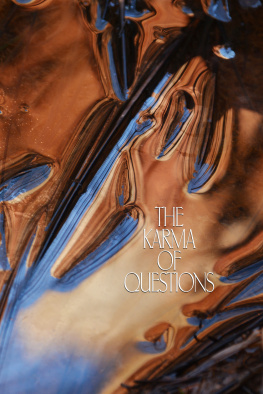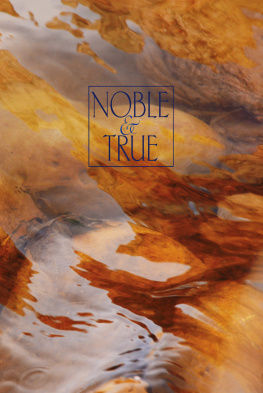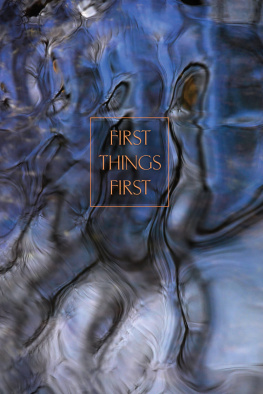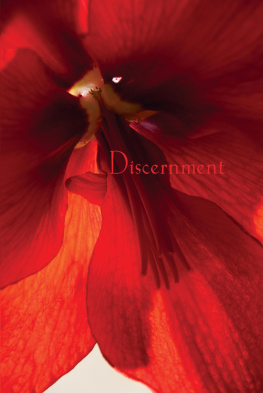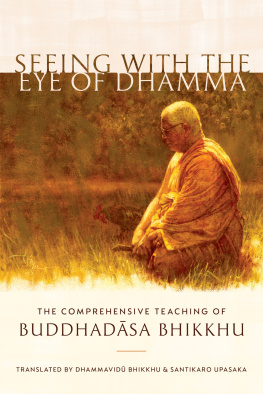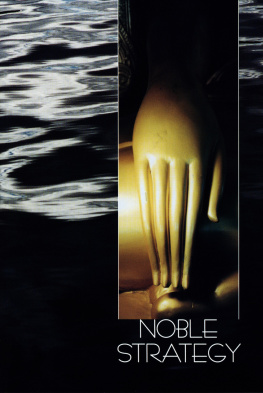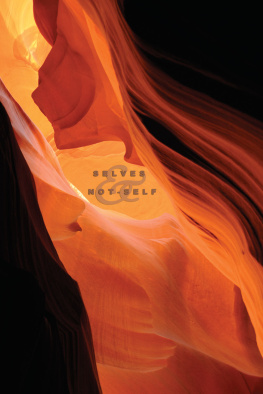Thanissaro Bhikkhu - The Karma of Questions
Here you can read online Thanissaro Bhikkhu - The Karma of Questions full text of the book (entire story) in english for free. Download pdf and epub, get meaning, cover and reviews about this ebook. year: 2016, publisher: Metta Forest Monastery, genre: Religion. Description of the work, (preface) as well as reviews are available. Best literature library LitArk.com created for fans of good reading and offers a wide selection of genres:
Romance novel
Science fiction
Adventure
Detective
Science
History
Home and family
Prose
Art
Politics
Computer
Non-fiction
Religion
Business
Children
Humor
Choose a favorite category and find really read worthwhile books. Enjoy immersion in the world of imagination, feel the emotions of the characters or learn something new for yourself, make an fascinating discovery.
- Book:The Karma of Questions
- Author:
- Publisher:Metta Forest Monastery
- Genre:
- Year:2016
- Rating:4 / 5
- Favourites:Add to favourites
- Your mark:
- 80
- 1
- 2
- 3
- 4
- 5
The Karma of Questions: summary, description and annotation
We offer to read an annotation, description, summary or preface (depends on what the author of the book "The Karma of Questions" wrote himself). If you haven't found the necessary information about the book — write in the comments, we will try to find it.
The Karma of Questions — read online for free the complete book (whole text) full work
Below is the text of the book, divided by pages. System saving the place of the last page read, allows you to conveniently read the book "The Karma of Questions" online for free, without having to search again every time where you left off. Put a bookmark, and you can go to the page where you finished reading at any time.
Font size:
Interval:
Bookmark:
This work is licensed under the Creative Commons Attribution-NonCommercial 4.0 Unported. To see a copy of this license visit http://creativecommons.org/licenses/by-nc/4.0/. Commercial shall mean any sale, whether for commercial or non-profit purposes or entities.
Metta Forest Monastery
Valley Center, CA 92082-1409
U.S.A.
More Dhamma talks, books and translations by Thanissaro Bhikkhu are available to download in digital audio and various ebook formats at dhammatalks.org.
A paperback copy of this book is available free of charge. To request one, write to: Book Request, Metta Forest Monastery, PO Box 1409, Valley Center, CA 92082 USA.
Theres no such thing as a totally idle question. Every question, even the most casual, carries an intention: the desire for an answer to fit a certain purpose. You might think of a question as a mold for a tool. The emptiness of the mold indicates the desired but missing knowledge; the shape of the mold, the use to which the knowledge will be put. Most people, when looking at a question, focus on the emptiness of the mold. The karma or power of the question, though, lies in its shape. If you ask Where did the universe come from?, the answer cant be jump. Any answer acceptable to the question has to address the ideas about existence, causality, and sources implicit in universe, come from, and where. And whatever stance the answer takes with regard to those ideas, it has to fit into the mold provided by the question. Even if it were to state that there is no universe or that the universe didnt come from anywhere, the act of giving an answer would affirm that the mold shapes a useful tool: an idea important enough to merit talking about and taking a stance.
The danger here is that if your actual problem requires a screwdriver, but your questions are designed to mold a hammer, any answers that fill the mold may do more harm than good. If you dont abandon the mold, then even if youre given a screwdriver, youll force it into the mold, add scraps of metal from here and there, and turn it into a hammer.
This was why the Buddha approached questions with great care. He divided them into four sorts: those deserving a straight answer, those that need their terms redefined, those deserving a counter-question in response, and those that should be put aside. In other words, he saw that some molds were useful as is, some needed adjusting, some were best countered with an alternative mold, and others were best thrown away. His criterion for classifying questions in this way was whether the answers would be useful in putting an end to suffering and stress.
As he had noted, suffering leads to two reactions: bewilderment (Why is this happening to me?) and search (Is there anyone who knows how to put an end to this pain?). These two reactions are a potent combination. If handled unskillfully, bewilderment can turn into ignorance, and search into cravinga surefire recipe for even more suffering. But if framed into a skillful strategy of clear and thoughtful questions, they take you to total freedom, beyond aging and death. So he deliberately framed his teachings to answer only the right questions. And he was especially careful to avoid questions that would foster craving or ignorance, delaying or obstructing the ending of stress.
The essays in this book are an attempt to follow the Buddhas example in approaching questions, trying to trace back to the questions that molded his teachings, and resisting the temptation to focus on questions that would force those teachings into a different shape. Ive gone on the assumption that his screwdrivers were so well-designed that they are right for our needs today, and that we should guard against turning them into hammers. If you find that the tools offered in this book are useful in ending your own sufferings, then Ive succeeded in my task.
Some of these essays, in earlier incarnations, have appeared in Tricycle, Buddhadharma, Inquiring Mind, and Insight Journal. The fact that they were originally intended for different audiences explains the overlap that occasionally occurs among them. It also explains the inconsistent use of Sanskrit and Pli terms: dharma, karma, and nirva in some essays; dhamma, kamma, and nibbna in others. I hope that this presents no difficulties.
hnissaro Bhikkhu
(Geoffrey DeGraff)
Metta Forest Monastery
Valley Center, CA 92082-1409
September, 2002
He showed me the brightness of the world.
Thats how my teacher, Ajaan Fuang, once characterized his debt to his teacher, Ajaan Lee. His words took me by surprise. I had only recently come to study with him, still fresh from a school where I had learned that serious Buddhists took a negative, pessimistic view of the world. Yet here was a man who had given his life to the practice of the Buddhas teachings, speaking of the worlds brightness. Of course, by brightness he wasnt referring to the joys of the arts, food, travel, sports, family life, or any of the other sections of the Sunday newspaper. He was talking about a deeper happiness that comes from within. As I came to know him, I gained a sense of how deeply happy he was. He may have been skeptical about a lot of human pretenses, but I would never describe him as negative or pessimistic. Realistic would be closer to the truth. Yet for a long time I couldnt shake the sense of paradox I felt over how the pessimism of the Buddhist texts could find embodiment in such a solidly happy person.
Only when I began to look directly at the early texts did I realize that what I thought was a paradox was actually an ironythe irony of how Buddhism, which gives such a positive view of a human beings potential for finding true happiness, could be branded in the West as negative and pessimistic.
Youve probably heard the rumor that Life is suffering is Buddhisms first principle, the Buddhas first noble truth. Its a rumor with good credentials, spread by well-respected academics and Dharma teachers alike, but a rumor nonetheless. The truth about the noble truths is far more interesting. The Buddha taught four truthsnot oneabout life: There is suffering, there is a cause for suffering, there is an end of suffering, and there is a path of practice that puts an end to suffering. These truths, taken as a whole, are far from pessimistic. Theyre a practical, problem-solving approachthe way a doctor approaches an illness, or a mechanic a faulty engine. You identify a problem and look for its cause. You then put an end to the problem by eliminating the cause.
Whats special about the Buddhas approach is that the problem he attacks is the whole of human suffering, and the solution he offers is something human beings can do for themselves. Just as a doctor with a surefire cure for measles isnt afraid of measles, the Buddha isnt afraid of any aspect of human suffering. And, having experienced a happiness totally unconditional, hes not afraid to point out the suffering and stress inherent in places where most of us would rather not see itin the conditioned pleasures we cling to. He teaches us not to deny that suffering and stress or to run away from it, but to stand still and face up to it, to examine it carefully. That wayby understanding itwe can ferret out its cause and put an end to it. Totally. How confident can you get?
Font size:
Interval:
Bookmark:
Similar books «The Karma of Questions»
Look at similar books to The Karma of Questions. We have selected literature similar in name and meaning in the hope of providing readers with more options to find new, interesting, not yet read works.
Discussion, reviews of the book The Karma of Questions and just readers' own opinions. Leave your comments, write what you think about the work, its meaning or the main characters. Specify what exactly you liked and what you didn't like, and why you think so.

